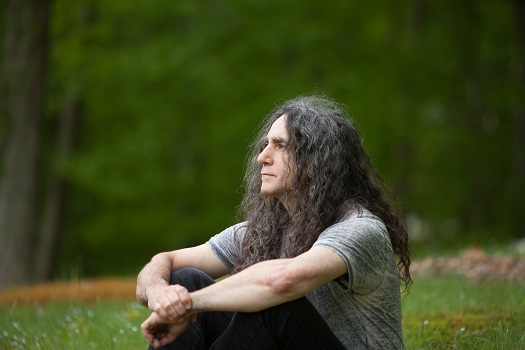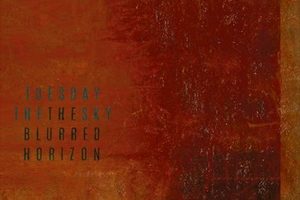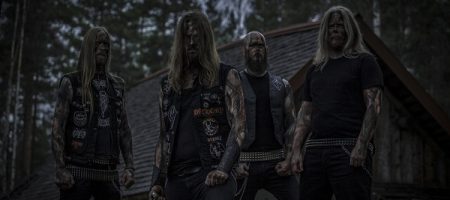Tuesday The Sky – An Open Horizon
Sunday, 15th August 2021
Guitarist Jim Matheos is probably best known for his work in the progressive metal and rock fields. From Fates Warning and OSI to Arch/Matheos, he’s made landmark albums that have influenced countless musicians worldwide. Tuesday the Sky though is a left-field turn, a solo project fueled with more of a calmer instrumental feel, incorporating electronic, industrial, alternative, and post-metal textures. The latest album The Blurred Horizon expands upon the foundation of the Drift debut from four years ago – striding into a kaleidoscope of atmospheric songs.
We reached out to Jim one weekday afternoon, and he brought us up to speed on the latest record, his love for recording at home, the addition of drummer Gavin Harrison to the mix, thoughts on the upcoming Fates Warning book, plus why the band will be waiting a little while longer to tour.
Dead Rhetoric: The Blurred Horizon is the second album for Tuesday the Sky. Where do you see the major differences in terms of the compositions and playing for this record compared to Drift, the first record from 2017?
Jim Matheos: You know, I don’t know if there are a whole lot of differences between the two. Except for a few years in between the first one and this one. I went into the first one without really knowing if it was going to be a record, it was more like experimenting for the first three or four songs. I was waiting to come up with guitar parts and interesting ideas. I didn’t have a direction in mind of what it was going to be. I didn’t know if it was going to be purely instrumental or if I was going to find a singer at some point.
Having done that, I knew this time around I wanted to keep it like the first one, make it more instrumental and have a little bit of vocals. This one was a bit more planned out. I happened to have a hole in my schedule and I decided that this was a good time to do another record. But I did have those parameters in mind with this record.
Dead Rhetoric: When it comes to developing the ideas, do you carve out specific time for something like this – or does the inspiration hit you and you stockpile ideas from there?
Matheos: I wish I could say it was more inspiration, but it’s a scheduling thing. At least for me with the many different things I do, I try to plan pretty far in advance. While I am doing one record, something else can be coming up. I like to schedule things like that.
Dead Rhetoric: Tell us about the guest drumming performance from Gavin Harrison, best known for his time in acts like King Crimson, Porcupine Tree, and The Pineapple Thief – what do you enjoy most about his playing for these tracks?
Matheos: I have worked with him before, he did one track on the last Fates Warning record. He is an incredibly musical drummer, just everything that he does. He has chops like nobody, but he knows when to play and what to play. He does everything in the service of the song. Whenever I have anything that I’m working on that needs a drummer, he is my go-to guy if he is interested for these things. Luckily for me he was available to do this, originally I wanted him for two songs where I had programmed drums that I wanted to add acoustic things to it, that I thought would sound really good with a real drummer to this. He had some time on his hands and he wanted to do it.
Dead Rhetoric: You mention in the background info the fact that when it comes to instrumental music, it’s hard to tell a story with any specificity. How do you handle the challenge of getting these ideas across in a proper fashion that the listeners can consume and understand without words, outside of the titles of the individual songs?
Matheos: I don’t worry about it too much, because I’m not trying to tell a story. I’m trying to create music that is interesting and create some kind of mood. What you get out of that, can be completely different than what I intended. When I write music I’m trying to appeal to myself first, what is interesting to me, and the titles are an afterthought. I ask myself what the feel of the music conjures up. I have some Excel files put away, and think about what would go with the music. Hopefully people can enjoy it.
Dead Rhetoric: Which tracks for The Blurred Horizon came the easiest to you, and which ones do you believe took a little more time to develop and refine until they reached completion?
Matheos: It’s funny, with this record as well as the first record, there’s no pressure. Everything came pretty easily, it was more a question of going to the studio every day and coming up with the initial idea for a song. They flowed pretty easily. Once I start a new song, it may take me a week or so to catch onto something interesting. Once that’s done, it’s just fun for me. The fun part of my day is going into the studio and working out ideas, it inspires me. Luckily I don’t have too much trouble doing that. It’s my second record, it’s pretty low key and there’s not a lot of pressure. I can do what I want and there’s no thoughts in the back of my head of what can be perceived by other people.
Dead Rhetoric: Do you find your best songwriting occurs in the morning after a good night’s sleep?
Matheos: (laughs). I start in the morning. If things are going well for me, I can start at eight in the morning and go to ten o’clock at night, no problem. If it’s not going well or I don’t feel inspired I’ll avoid the studio like the plague.
Dead Rhetoric: What can you tell us about the abstract cover art for The Blurred Horizon? I especially enjoy the diverse color scheme that mirrors what listeners can expect on the record…
Matheos: Yeah, it was planned out that way. I haven’t seen the final product, but from the computer file I saw it has that specific color scheme with the orangish color, versions of turquoise. We got a photographer to do this, Chris Friel. He does amazing stuff. Everything he does is photographs. He creates stuff like that. You can get lost for hours looking at his material. The hardest thing is trying to narrow it down.
Dead Rhetoric: The new video for the title track came out recently – is it an easy process to decide what track(s) to promote the record, especially one such as this?
Matheos: I leave that to the record company. I’m not a real good judge based on this kind of music. I don’t know what will grab people’s attention. They have the ideas and they run them by me, but I leave that in their hands because it’s marketing decisions and I’m really not good at it. I trust them to put me in the right direction and decide what are the right songs to put out.
Dead Rhetoric: Do you believe you gain appeal from a different audience because this music is so different from what you’ve been known for previously?
Matheos: I hope so. I think there is a certain subset of fans that like Fates Warning or Arch/Matheos that maybe like this. But we may have a wider audience that may not listen to metal that will listen to this, we shall see.
Dead Rhetoric: Has your process of writing and recording evolved and changed over the years, especially considering how long you’ve been working at your craft since the start of Fates Warning? Do you enjoy the ability to refine and hone in on things at home with technology at your disposal compared to the days of bigger studios and being on the clock hourly so to speak?
Matheos: It’s a double-edged sword, really. This is how we have been doing things now, I enjoy doing this. It’s been this way since the early 2000’s, recording here at home. Certainly the benefits outweigh the drawbacks, but for me I can be in the studio twelve to fourteen hours a day, easily. I’m enjoying what I am doing, and sometimes it’s good to have that outside, objective voice that tells you that you need to step away from that, and that’s the one thing I am lacking here. You can get carried away, and often times overcook things to the point that I work on something too long, a number of months will go by and I’ll like an original version of a song better – and then spend weeks getting it back to where it was.
That’s the price you pay for the time and comfort that you have doing records at your own pace at home. And that’s the major difference – you would in the past put in the studio time, be on the clock in the expensive studios and hopefully having your parts worked out well in advance because studio time is expensive and things had to be scheduled so far in advance. These days at least for me, there’s maybe a little more room for improvisation, doing on the fly at home. I can sit for a day or two and see if I like things, instead of having everything written out exactly how it’s going to be before you go into the studio.
Dead Rhetoric: Do you think it’s harder to be self-critical because you’ve been doing music for so long?
Matheos: I don’t know if that’s the reason. It certainly is for me. It may just be personality, I imagine there are a lot of people who can do home recordings and move along to the next thing. It may be personality quirks and minor things that come up.
Dead Rhetoric: There will be a Fates Warning book coming out soon detailing the history of the band. How does it feel to be honored in this way, and how have you looked at the career arc of the group from the early 80’s to today?
Matheos: It’s been great, I have been working closely with Jeff (Wagner) for a good year and a half. It’s surreal, really. It’s been fun to go back and listen to things and think of these things I haven’t thought of in thirty plus years. I hope it sells well for him, and I hope people really enjoy reading it.
Dead Rhetoric: When looking at your long musical career, what are some of the proudest or stand out moments that you can think of that will stand the test of time? Are there specific albums, videos, tours, festivals, or other key moments where you knew you were making an impact with your work?
Matheos: I don’t know if I have any of those, or if specific things come to mind. I am thankful I am a musician, and I make a living at this. For me, that’s the biggest accomplishment. When I was young, it was the only thing I wanted to do, no matter what it took, no matter at what level, I wanted to be a musician. I didn’t want a day job doing something I hated. As a teenager I thought about this, and I’ve gotten to do that. To me that’s the biggest accomplishment, to be able to do that and still be able to do that.
Dead Rhetoric: How have you handled the changes in the music industry from your earliest days as a musician to today’s landscape?
Matheos: I think I’ve handled it as well as anybody can. Like we were talking before with the studio expenses, records don’t sell as much as they used to, but on the other hand they are a lot cheaper to make. We used to spend in the day $200,000 on a record, and hopefully sell a lot of copies to make that money back. These days we spend a lot less than that, of course the sales are a lot less too. It’s a learning curve, you do the best you can. I roll with the punches and do the best that I can with what is out there these days.
Dead Rhetoric: What would surprise people to learn about Jim Matheos away from the music as far as your personality or hobbies/interests you may have away from your musician activities?
Matheos: Hmm… what would interest people. Sad to say I don’t have a lot of interests or activities outside of music. It’s why I do – I guess I am lucky in the fact that I enjoy doing this. It’s exciting to be able to get up in the morning and work on a piece of music. That’s what I do. I stay here and work on music. I don’t know if that would surprise anybody.
Dead Rhetoric: How do you see the next year shaping up for activities in your musical world? How do you foresee the world developing coming out of this global pandemic, especially when it comes to shows/tours?
Matheos: I have no idea how things will pan out with the pandemic. I saw a thing the other day that things were getting better, but then numbers are up again. It sucks for us because (Fates Warning) put out a record last November and we haven’t been able to tour on it. It will be at least until the spring of next year or later until we can go out. I know a lot of bands are going out now, me I wouldn’t feel comfortable doing that. It’s going to be a question of when the all clear is out there, and when I say all clear I mean all clear, not somewhat safe in some areas. I have this record coming out, and I’m about 90% done with another one I’ve been working on since the beginning of the year – and that will be out sometime next year.
























